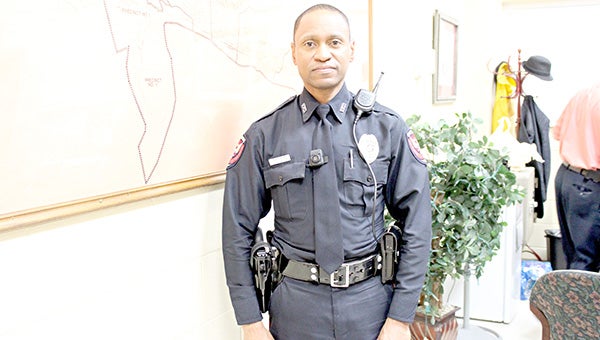VPD ready to use body cameras
Published 12:00 am Sunday, January 24, 2016

- Patrolman Robert Starks wears one of the new body cameras the Vicksburg Police Department will be implementing to all officers over the next few weeks. ALANA NORRIS•The Vicksburg Post
Body cameras will soon be used in the Vicksburg Police Department.
At Tuesday’s Board of Mayor and Aldermen meeting, an agreed upon comprehensive policy and procedure was accepted by the board.
Now that the policy has been finalized, uniformed officers will go through training on the cameras and over the next few weeks will begin to wear them in the line of duty.
“We’ll probably do 10 or so at a time,” Billy Gordon, city IT director, said. “We’ve got to train the guys and make sure the video is downloading properly. We don’t want to put all of them out there and then there be a problem.”
The policy dictates when the cameras should be on and when they should be off, what the officers do with the video, how and when video will be downloaded to make sure everyone is going through the same process.
Mayor George Flaggs Jr. said the policy was based on other cities’ policies and it would protect them as much as possible from any liabilities. He said he feels good about the cameras.
“Now that we’ve resolved all the legal issues regarding the body cameras, it’s up to (Vicksburg) Chief (Walter) Armstrong to implement the policy and allow his officers to wear the body camera,” Flaggs said. “It’s strictly in his hands now.”
The VPD purchased 81 body cameras for $62,980 in July, according to an invoice reviewed by the Board of Mayor and Alderman. The cameras were purchased with seized drug money.
“They were purchased at no cost to the city,” Armstrong said.
Armstrong said it was imperative for the department and the city to spend an extensive amount of time working on the policy to make sure it was a solid plan to guide the use of the cameras. He wants to get the cameras on the streets soon, but he also wants to make sure the officers are properly trained.
“We want to go over every page of the policy to every officer who will be utilizing the camera before we actually start using them,” Armstrong said. “But we want to go ahead and expeditiously get the cameras out on the street now that the policy is completed.”
He said each uniformed officer would be issued a camera in the next two to three weeks once they can be trained and outfitted with the equipment. Non-uniformed personnel, like investigators, will use the cameras on a limited basis, like serving a high-risk warrant.
Armstrong said they are being proactive by implementing the cameras and the department has not received any major complaints on officers’ ability to perform their duties that have warranted the use of cameras.
Recording police functions is necessary in this day and time, he said, because of the allegations that have come up across the country recently. He thinks using cameras is in the best interest of the citizens and the officers.
By using cameras, he thinks it could help lessen internal affairs complaints, and he said the recordings would be used in training officers on how to handle, and how not to handle, certain situations.
“We will be downloading this information and keeping it for a period of time according to the policy,” Armstrong said.
Armstrong stressed that officers would not use their cameras in places where privacy is expected like restrooms or at a restaurant while an officer is eating lunch.
However if an officer is on an official call in a restaurant, the camera will be used.
“These officers will be required to have these cameras on anytime they perform any police functions,” Armstrong said.





